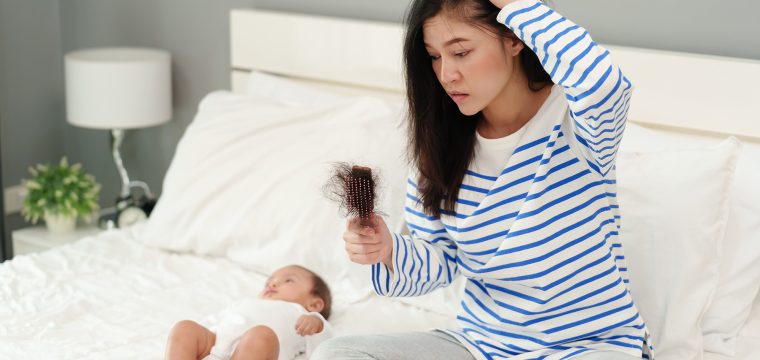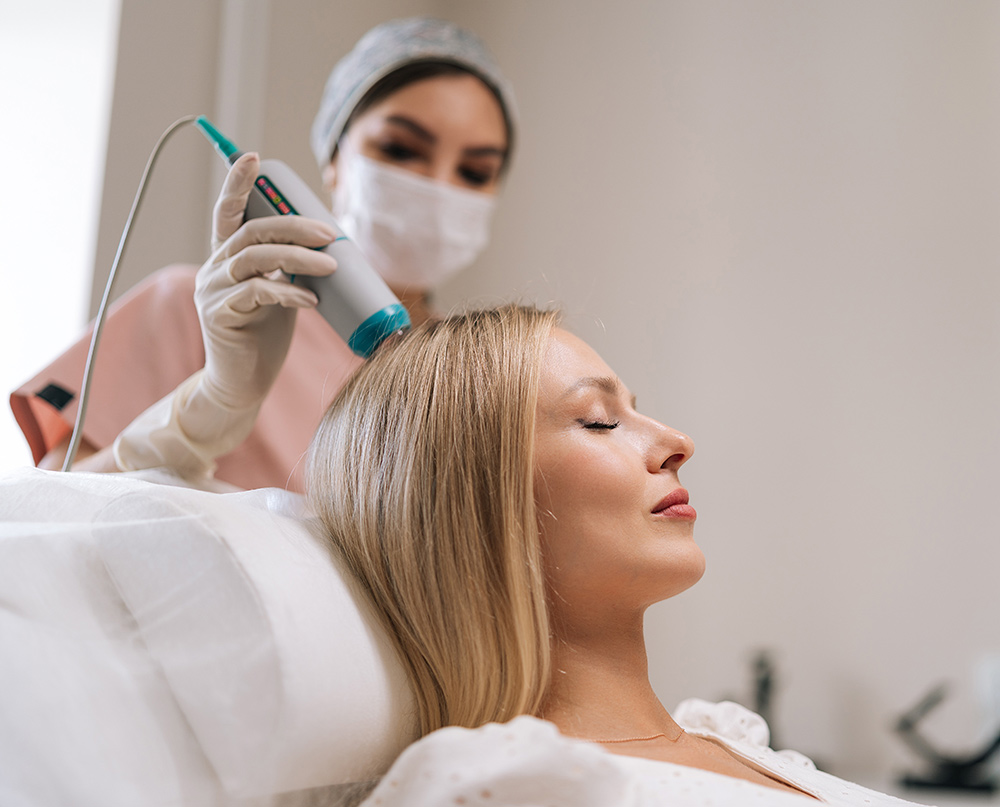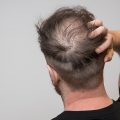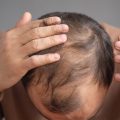
Postpartum Hair Loss: What New Mums Need to Know
Last updated on July 14, 2025
It’s one of those surprises no one really warns you about. Just when you’re starting to feel like yourself again after giving birth, you notice your hair shedding in clumps. The good news? You’re not alone, and in most cases, it’s entirely normal. Postpartum hair loss affects many women, and while it can feel concerning, it’s usually temporary. Here’s what new mums need to know, from our Melbourne hair growth clinic.
What Causes Postpartum Hair Loss?
During pregnancy, higher levels of oestrogen keep your hair in the growth phase of the natural hair cycle for longer. That’s why many pregnant women report thicker, shinier hair. However, once you give birth and hormone levels drop, this cycle shifts. The hairs that were previously in the growth phase all move into the shedding phase (called telogen) at once — leading to noticeable hair fall, typically around 2–4 months after birth.
This type of hair loss is known as telogen effluvium, a condition triggered by a sudden change in the body. In the case of postpartum women, it’s largely hormonal, but it can also be influenced by factors like stress, fatigue, dietary changes, or iron deficiency.
How Much Hair Loss Is Normal After Birth?
It’s normal to shed around 50–100 hairs a day. But after having a baby, this number can climb significantly — sometimes up to 300 hairs per day or more. For some women, this means extra strands in the shower or on the pillow. For others, it might lead to visibly thinner patches, particularly around the temples and hairline.
While this can be upsetting, it’s important to remember that postpartum hair loss is almost always temporary. Most women notice regrowth within 6 to 12 months after childbirth.
When Should You Be Concerned?
Although postpartum shedding is expected, there are times when it’s worth speaking to a medical professional. Consider getting help if:
- The hair loss persists for longer than 12 months.
- You notice bald patches or severe thinning.
- Your eyebrows or body hair is also thinning.
- You’re experiencing other symptoms like fatigue, mood changes, or irregular periods — which could point to thyroid issues or anaemia.
In these cases, a GP or hair specialist can help identify any underlying conditions and recommend appropriate treatment.
Can You Prevent Postpartum Hair Loss?
There’s no guaranteed way to prevent hormonal hair loss after pregnancy, but you can support healthy hair regrowth by taking care of your overall well-being. Here are some tips:
1. Eat a Balanced Diet
Hair follicles need a mix of vitamins, minerals and protein to function properly. Try to eat a variety of iron-rich foods, leafy greens, eggs, berries, nuts, whole grains, and lean protein sources.
2. Keep Taking Your Supplements
Continue with your prenatal or postnatal supplements, especially if you’re breastfeeding. Nutrients such as iron, zinc, vitamin D and biotin all support hair growth and scalp health.
3. Be Gentle With Your Hair
Avoid tight hairstyles, heavy brushing, or excessive heat styling. Choose a wide-tooth comb, pat your hair dry rather than rubbing it, and let it air dry when possible.
4. Choose a Mild Shampoo and Conditioner
Switch to hair products designed for thinning hair or sensitive scalps. Look for volumising or nourishing formulas that don’t strip your scalp’s natural oils.
5. Minimise Stress Where You Can
Yes, easier said than done with a newborn! But stress can prolong or worsen hair shedding. Make time for small moments of self-care, ask for help, and try mindfulness techniques or short walks to reset your nervous system.
Supporting Healthy Hair Regrowth
Once shedding slows down, most women will start to see baby hairs growing back around the hairline and temples. You can help encourage new hair growth with:
- Scalp massage: Boosts blood flow and brings nutrients to the follicles.
- Topical scalp treatments: Certain serums and tonics support healthier hair regrowth, but always check with your doctor or pharmacist, especially if breastfeeding.
- Gentle styling: Letting your hair rest from ponytails and straighteners reduces strain on fragile regrowing strands.
Emotional Side of Postpartum Hair Loss
Hair can feel closely linked to your sense of identity, and losing it — especially at a time when you’re already adjusting to motherhood — can be distressing. Many women find postpartum hair loss undermines their sense of control during an already challenging time. It’s okay to acknowledge these feelings.
Some practical steps to feel more comfortable might include:
- Trying a new haircut or style that adds volume.
- Using headbands or clips to disguise thinning areas.
- Talking to other mums who’ve gone through it.
- Seeking help from a professional if it’s affecting your mental health.
Remember: it’s not vanity to care about your appearance. It’s a form of self-care, and your wellbeing matters.

Hair loss can be incredibly distressing, but help is available. At Hair Transplants Melbourne, we offer tailored solutions to help restore your hair after postpartum shedding or more severe hair loss, using safe, proven treatments designed for women.
When Hair Loss Becomes More Serious
Although most cases resolve naturally, postpartum hair loss can sometimes uncover pre-existing or underlying conditions such as:
- Genetic hair loss (female pattern hair loss), which may become more noticeable post-birth.
- Chronic telogen effluvium, where hair continues to shed beyond 6–12 months.
- Autoimmune conditions like alopecia areata.
If the hair loss feels excessive, continues well into your baby’s first year, or you’re concerned something more complex may be at play, it’s time to seek expert advice.
A Path Forward With Professional Care
If you’re struggling with postpartum hair loss or feel it’s not improving with time, professional help is available. At Hair Transplants Melbourne, we understand the physical and emotional impact of hair loss and offer tailored solutions for women at all stages of life — including after pregnancy.
Our team provides a range of non-surgical and surgical options to support healthy hair growth, from Liquid Hair Therapy and scalp micropigmentation to growth factor and stem cell-based treatments. We’ll take the time to assess your scalp, identify the cause, and create a plan that works for you — whether you’re in the early stages of shedding or experiencing long-term thinning.
Book a consultation or request a free online quote to explore the most effective hair loss treatment options for your hair and scalp. We’re here to help you feel more in control, supported, and informed — every step of the way.
Hair Transplants Melbourne – Trusted by women across Australia for safe, personalised hair loss treatment and restoration.
FAQs
What treatments are available for postpartum hair loss?
Postpartum hair loss often resolves on its own, but if shedding is excessive or persistent, supportive treatments may help. At Hair Transplants Melbourne, we offer non-surgical therapies such as growth factor treatment, Liquid Hair Therapy, scalp micropigmentation, and Regenera stem cell treatments. Each treatment is tailored to your needs. Book a consultation or contact us now to learn more.
Can I use hair loss treatments while breastfeeding?
Some treatments for hair loss are safe during breastfeeding, while others should be delayed. At Hair Transplants Melbourne, we’ll assess your individual situation and recommend the safest options, including non-invasive therapies like scalp treatments or supportive nutrition advice. Book a hair loss consultation or arrange a free 15-minute call to get advice tailored to your postpartum stage.
Will my hair grow back the same after pregnancy?
In most cases, yes—your hair will return to its usual thickness over time. However, texture or growth patterns may change slightly. If your hair remains thin or patchy after 12 months, you may benefit from expert treatment. Hair Transplants Melbourne can assess your scalp and recommend tailored hair loss treatments to restore density and improve hair quality. Book a consultation or a free 15-minute phone consult to get started.
What causes hair loss after giving birth?
Postpartum hair loss is mainly caused by a drop in oestrogen levels after delivery, which shifts hair into a shedding phase. Other factors like stress, iron deficiency, and lack of sleep can contribute. If your hair isn’t bouncing back, Hair Transplants Melbourne offers targeted hair growth treatments to support regrowth. Speak to our experts during a full consultation or book a free 15-minute phone call to ask questions.
How can I tell if my hair loss is postpartum or something more serious?
Postpartum shedding usually begins a few months after birth and gradually improves. If you’re noticing bald patches, excessive thinning, or other unusual symptoms, it could be something more complex like genetic or hormonal hair loss. At Hair Transplants Melbourne, we can identify the cause and tailor a treatment plan that suits your needs. Book a full consultation or arrange a free 15-minute phone call to get clear answers.










